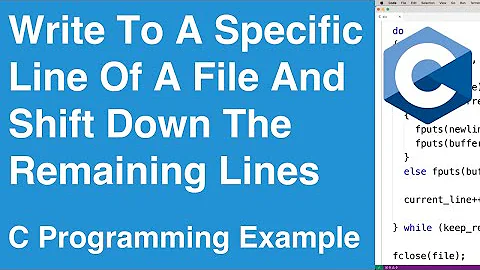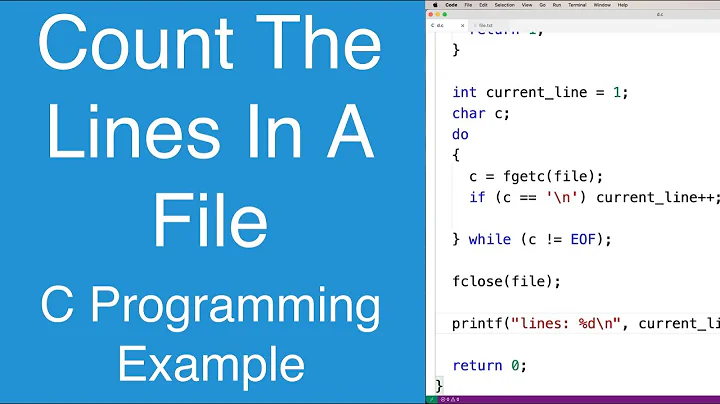How to get a particular line from a file
23,823
Solution 1
Try one of these two solutions:
file = File.open "file.txt"
#1 solution would eat a lot of RAM
p [*file][n-1]
#2 solution would not
n.times{ file.gets }
p $_
file.close
Solution 2
You could get it by index from readlines.
line = IO.readlines("file.txt")[42]
Only use this if it's a small file.
Solution 3
def get_line_from_file(path, line)
result = nil
File.open(path, "r") do |f|
while line > 0
line -= 1
result = f.gets
end
end
return result
end
get_line_from_file("/tmp/foo.txt", 20)
This is a good solution because:
- You don't use
File.read, thus you don't read the entire file into memory. Doing so could become a problem if the file is 20MB large and you read often enough so GC doesn't keep up. - You only read from the file until the line you want. If your file has 1000 lines, getting line 20 will only read the 20 first lines into Ruby.
You can replace gets with readline if you want to raise an error (EOFError) instead of returning nil when passing an out-of-bounds line.
Solution 4
File has a nice lineno method.
def get_line(filename, lineno)
File.open(filename,'r') do |f|
f.gets until f.lineno == lineno - 1
f.gets
end
end
Solution 5
linenumber=5
open("file").each_with_index{|line,ind|
if ind+1==linenumber
save=line
# break or exit if needed.
end
}
or
linenumber=5
f=open("file")
while line=f.gets
if $. == linenumber # $. is line number
print "#{f.lineno} #{line}" # another way
# break # break or exit if needed
end
end
f.close
If you just want to get the line and do nothing else, you can use this one liner
ruby -ne '(print $_ and exit) if $.==5' file
Related videos on Youtube
Comments
-
Skizit almost 2 years
Is it possible to extract a particular line from a file knowing its line number? For example, just get the contents of line
Nas a string from file "text.txt"?-
 Ulysse BN over 4 yearsI felt really misleaded by a lot of answers below. IMHO, the best one is the comment below this answer: no memory issue, and straight to the point.
Ulysse BN over 4 yearsI felt really misleaded by a lot of answers below. IMHO, the best one is the comment below this answer: no memory issue, and straight to the point.
-
-
Bushra Khan over 13 yearsHehe, that's what you get from fellow Rubyists when you try to write optimized code eh? :)
-
Nakilon over 13 yearsIn different languages you must optimize different things.
-
Bushra Khan over 13 yearsI'd argue that reading an entire 20MB file into memory to get one line from it is bad practice in any language.
-
Bushra Khan over 13 years..I'd also argue that
get_line_from_fileis a terrible method name. And that the implementation itself could be rewritten to be more ruby-like. But I digress.. -
Nakilon over 13 years@August Lilleaas, i'd argue, that here you don't need
result = nil,returnand write C-style loops, when you havetimes. -
Mark Thomas over 13 yearsIs solution #2 getting line n+1?
-
Nakilon over 13 years@Mark Thomas, in #1 too. I supposed indexing from 0.
-
Nakilon over 13 yearsNice. That's when global $-variables become useful.
-
steenslag over 13 yearsThis keeps on reading the file when the line is already found.
-
tig over 13 yearsThanks for
[*File.open('…')], did not know thatto_afor File instance can give me its lines -
tig over 13 years@Nakilon: file lines are indexed from 1 (all editors and even
cat -ndo so) -
ghostdog74 over 13 yearsDoesn't matter. If the line number is last 2nd line for example, it has to read until that line as well...
-
Mark Thomas over 13 yearsYou don't really need lineno(). You could replace the 'until' line with
(lineno-1).times {f.gets}. -
Bushra Khan over 13 yearsIt's a matter of preference. I prefer to explicitly have a return for longer methods where you're supposed to use the return value. I think it increases clarity by making the usage of the method clearer.
-
Maxim Kulkin over 13 yearsRegarding #2: I think unsplat is costly operation. Also, syntax is confusing.
-
Nakilon over 13 years@August Lilleaas, I think, Ruby is not your language of life ..)
-
Bushra Khan over 13 yearsThankfully, I can write as much ruby as I want, the way I want, and I don't have to listen to what cargo culters want me to do :)
-
 Joseph Ravenwolfe over 11 yearsThanks for this answer, exactly what I was looking for.
Joseph Ravenwolfe over 11 yearsThanks for this answer, exactly what I was looking for. -
 PJP over 8 yearsThis is only the right answer if the file is small, less than a couple MB. Otherwise it'll force Ruby to load the entire file at once, which, in the case of a large file is slower than using a
PJP over 8 yearsThis is only the right answer if the file is small, less than a couple MB. Otherwise it'll force Ruby to load the entire file at once, which, in the case of a large file is slower than using aforeachorgetsbased solution. See stackoverflow.com/questions/25189262/why-is-slurping-a-file-bad which contains benchmarks. -
 Jonas Elfström over 8 yearsI was surprised to learn that it takes as much as a couple of MB!
Jonas Elfström over 8 yearsI was surprised to learn that it takes as much as a couple of MB! -
 Joshua Grosso Reinstate CMs about 8 years@AugustLilleaas when you use a language, however, you should write it idiomatically, if only for the reason that languages often optimize idiomatic constructs more than other ones. Also, if anyone's ever going to maintain your code, it's a disservice to not learn the right way to do it.
Joshua Grosso Reinstate CMs about 8 years@AugustLilleaas when you use a language, however, you should write it idiomatically, if only for the reason that languages often optimize idiomatic constructs more than other ones. Also, if anyone's ever going to maintain your code, it's a disservice to not learn the right way to do it.








